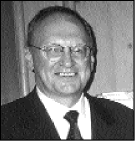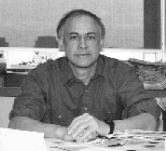
|

|
|
|
|
| | VOLUME 29, NUMBER 30 | WEDNESDAY, APRIL 28, 1999 | ISSN 1199-5246 | | |
|
|
||||
|
|
By Sandra Guiry an early twentieth century ornithopter Glendon College Senior Scholar and Associate Professor of Natural Sciences, Daphne Schiff began flying airplanes 25 years ago; before that Schiff was afraid to fly. Her husband took piloting lessons with an instructor and Schiff thought it would be nice to try it too. Soon she attained her commercial pilots licence, and the rest is history. Schiff has flown in racing competitions around the world with some of the top female pilots and her students have gone on to top level positions in the aviation industry, including the first female air traffic controller in Canada. It is her involvement with ornithopters, however, which is most unique. An ornithopter is an aircraft that uses flapping wings to move through the air. Leonardo da Vinci was among the first to design ornithopters. He believed that birds could be imitated in flight. When a bird is gliding it flies the same way as an airplane (fixed-wing aircraft), but birds also flap their wings up and down. Wind comes from below the wing during the downstroke and from above on the upstroke. The wings must constantly twist so they have the appropriate angle of incidence at each point in the flapping cycle. "Flying in an ornithopter is distinct from flying in other aircraft, because the up and down flapping motion of the wings of an ornithopter cause the instruments to become a haze and a blur. It's very bumpy," said Schiff during a recent interview. The landing of an ornithopter, however, is not as bumpy or dangerous as one might think. Prior to landing, an ornithopter essentially becomes a glider and like other aircraft has a smooth descent. In order for an ornithopter to take off successfully it must reach at least 50 miles per hour. The lightness of the ornithopter is crucial to its ability to take off, so Schiff recruited pilot Patricia Bowman who weighs under 100 pounds. Bowman says she got involved with the ornithopter project because she wanted to do something unusual. She has volunteered and dedicated her life to making the project a success. According to Schiff, the application of a functional ornithopter is as a showpiece. "You will not see it as a passenger plane," she predicted. "However, it would be very nice to see one fly across the English Channel replicating the famous first human-powered flight across by the Gossamer Albatross in 1979." Schiff has previously taught the "Science of Flight" course at York and the "Physics of Flight" at Glendon College. She is also the co-captain of her company called "AIR-O-SOLS", flying government sponsored pollution-monitoring flights. Schiff has produced award-winning documentary science films including "The Northern Wetlands: Its Role in Global Warming". She hopes to document flights of her ornithopter as well.
Sandra Guiry is a graduate student in political science at York University.
|
|||
|
|
Canadian ambassador to Germany lectures at York York University 
Canadian Ambassador to Germany Gaëtan Lavertu examined some of the prospects and challenges facing Germany during a recent lecture and discussion at York University. The lecture entitled, "Germany's Prospects on the Eve of the New Millennium" was sponsored by York's Canadian Centre for German and European Studies, a Canada-wide research and teaching resource focusing on contemporary Germany in its European context. Lavertu has distinguished himself in a number of assignments abroad with the Department of Foreign Affairs and International Trade in Madrid, Rabat, Caracas, Brussels, Bogota and London. York University's Faculty of Fine Arts is renewing its stock of pianos and hosting a sale on campus in association with Kawai Canada Music Ltd. and Y.C. Chau & Sons Pianos Inc. More than 100 pianos will be offered, including grands and uprights - some new, others professionally refurbished - plus a wide selection of 88 note digital pianos. Instruments will be available in many sizes and finishes. Brand names include Kawai, Yamaha, Baldwin, Heintzman, and others. Arrange an early appointment for better selection.
|
|||
|
|
Farewell: The following is my statement of appreciation to a York University Professor who's teaching, through the course SOSC 1010 6.0, have provided me with new clarity about life, and an unmeasured optimism about my potentials in living a truly fulfilling life. This Professor is John Ridpath. From the beginning of the course, Prof. Ridpath appeared ambitious to expose his students to an important issue, that being "the role of ideas in human life". As time passed I began to understand his ambition. I began to recognise that, indeed, ideas form the foundation of man's life, and that this foundation may be good or bad depending on the nature of his ideas. My purpose here in is not to recap the contents of the course, or to advocate any idea(s). Rather, it is to give deserved recognition to my teacher. Once I was asked, "what practical gain do you expect to receive from University, besides the accumulation of credits, and consequently a degree?" Well, here is my answer. Through my exposure to Prof. Ridpath I have gained the greatest asset a student could hope for, that being his ideas. I have also been inspired by observing the pleasure he received from guiding inquiring students, both during lectures and office hours. After many years, SOSC 1010 has finally come to a conclusion. In the name of all the students who have gained from this course throughout the years, I would like to thank prof. Ridpath for being a most inspiring and thought provoking teacher. York University students and your fellow professors can be proud to have you and those teachers who are like you, as part of the York community. Amir Pichhadze, York University student
|
|||
|
|
 By Susan Scott
By Susan Scott
Armed with her recently-awarded Walter Gordon Fellowship, psychology Professor Ellen Bialystok, will spend a year researching language and cognitive skills of bilingual children, to complete her book titled, Bilingualism in Development: Languages, Literacy and Cognition. The prestigious Walter Gordon Fellowship is presented periodically by York University to distinguished scholars at the university to recognize outstanding research. It is named in honour of the late Hon. Walter L. Gordon, former Chancellor of York. The Fellowship allows the recipient the opportunity to complete works or projects which require a significant amount of time, relieving them of teaching and other university responsibilities. "This is a wonderful opportunity. I'm fortunate to be able to have this time to finish my book," says Bialystok. She will spend from July of this year to next June on her project. Once her book is published, she says it will be used by researchers doing similar work, and as an advanced level language text for upper undergraduate and graduate students. Bialystok's primary interest is how bilingual children, particularly those up to the age of six, develop cognitive skills differently than unilingual children. Some of her questions include: are bilingual children smarter than unilingual children (a theory some researchers believe), can bilingual children keep their languages separate in their minds, and how do they begin learning language? "There are some interesting things going on at that age," she explains. "My focus is on children who speak two languages at home, because their development is in the context of two languages, rather than children who speak one language and learn another at school, for example, through immersion programs." Bialystok has arranged to spend up to a month at each of four centres throughout Europe that are also researching this issue. She plans to visit Holland, Israel, Wales and Switzerland. "There is a lot of researching going on in Europe but we don't hear about it, perhaps because work isn't published in English. Also, those researchers don't attend the same conferences as we do which would allow us to hear about what they're doing."
|
|||
|
|
By Susan Scott Parkdale Community Legal Services, a partnership of the Ontario Legal Aid Plan and York's Osgoode Hall Law School, has received the 1998 Guthrie Award from the Law Foundation of Ontario. PCLS was recognized for its outstanding contribution as Ontario's first community-based legal aid clinic and for its excellence in legal services to the residents of the community. The Guthrie Award is given annually to a person or an organization for performing outstanding public service which makes a significant contribution to enhancing the adminstration of justice or to furthering the objectives of the Law Foundation of Ontario. These include: legal education and research, legal aid or the establishment, maintenance or operation of law libraries. The award was created to honour Donald Guthrie, former chair of the Law Foundation. In his nomination of PCLS, the Honourable Mr. Justice J.C. MacPherson of the Ontario Court of Justice said, "...the enduring partnership between the Ontario Legal Aid Plan and Osgoode Hall Law School of York University, which has accounted for the ongoing success of the clinic, has shown that the commitment and leadership of dedicated people can create profound and far reaching benefits for not only the most disadvantaged amongst us, but all members of our community." Karen Jackson, co-chair of PCLS says, "of course we were pleased to receive the award for the work PCLS has done. I also believe this is recognition of all the other legal aid clinics that operate in Ontario." There are 71 legal aid clinics across the province. Jackson says what makes PCLS distinct is the availability of Osgoode students each semester which allows more work to be done in the community. Two articling Osgoode law students are part of the 20-member permanent PCLS staff and during each of the two regular academic terms and during a third summer term, approximately 18-20 Osgoode students work full-time in the clinic. "Because of the students' participation, I believe the clinic is more effective in its community development work such as working with tenants' groups on housing issues, working with psychiatric survivors on their pride day celebrations, and organizing homeless people and helping them find legal services," says Jackson. PCLS was established 26 years ago and serves primarily impoverished and disadvantaged people in Parkdale. It also provides community development and outreach work in the area. It also provides legal education for Osgoode students in poverty law, income security, workers' and tenants rights, and immigration and refugee law. |
|||
|
|
By Susan Scott Edward Lee-Ruff, York chemistry professor, has received a $102,000 two-year grant from the Ontario HIV Treatment Network (OHTN), the first time the OHTN has awarded a project grant in chemistry. Lee-Ruff's project is Combinatorial Synthesis of Novel HIV-1 Reverse Transcriptase Inhibitors. It focuses on developing a synthetic method for producing anti-viral agents, specifically those for the therapeutic treatment against HIV, the virus that causes AIDS. In 1997, Lee-Ruff and two colleagues received a U.S. patent for a new method of producing anti-cancer and anti-viral agents called nucleosides, also used in combination therapy for the treatment of AIDS. A Canadian patent for this method was recently approved. "We have been working on the nucleoside project for several years which culminated in receiving the patent," he explains. "Now, we intend to take this project to the next stage." That next stage means developing this method on solid support, one important aspect in the larger context of combinatorial chemistry. Lee-Ruff describes combinatorial chemistry as a "way of producing prospective drug candidates, in this case, anti-HIV agents." Lee-Ruff explains that HIV mutates quickly and therefore some drugs which are in current use may become ineffective in treating the disease. The advantage of combinatorial chemistry, he says, is the ability to make many chemical compounds at once with slight variations in molecular structure to respond effectively towards these mutated viruses.
|
|||
|
|
Everyone in the York community interested in 40th anniversary memorabilia can find what they're looking for at the York University Book Store. All merchandise features the 40th anniversary logo. Items pictured here are:
|
|||
|
|
A Status Report on Parking has been prepared by The Department of Safety Security and Parking Services. It is currently available at Parking Services or on the DSSPS web site at www.ssp.yorku.ca/parking/StatusRep.htm Watch for a copy of this report in the May 5th, 1999 issue of Gazette.
|
|||
|
|
.gif)
York University Campus, College Complex I -; circa 1965 (York University photographic collection, York University Archives)
|
|||
|
|
|
| ||
|
| Current Issue | Previous Month | Past Issues | Rate Card | Contact Information | Search |
|


